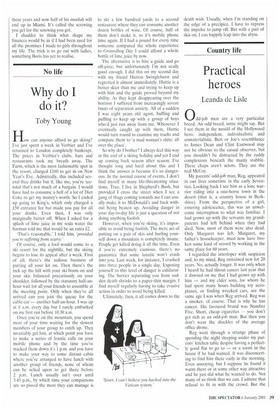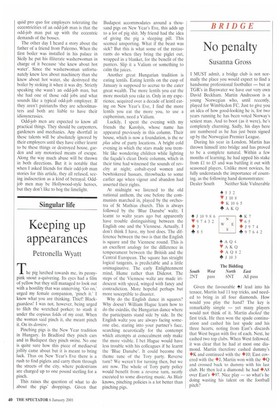Practical heroes
Leanda de Lisle
Odd-job men are a very particular breed. An odd breed, some might say. But I sec them in the mould of the Hollywood hero: independent, individualistic and unmaterialistic. Bert or Joe's resemblance to James Dean and Clint Eastwood may not be obvious to the casual observer, but you shouldn't he distracted by the ruddy complexions beneath the manly stubble. These chaps aren't actors. They are the real McCoy.
My parents' odd-job man, Reg, appeared in our lives sometime in the early Seventies. Looking back I see him as a lone warrior riding into a one-horse town in the desert (that is, a country house in Berkshire). From the perspective of a girl, entering adolescence, this was an unwelcome interruption to what was familiar. I had grown up with the servants my grandparents had left behind when they had died. Now, most of them were also dead. Only Margaret was left. Margaret, my father's housekeeper, must now have broken some kind of record by working in the same place for 60 years.
I regarded the interloper with suspicion and, to my mind, Reg remained new for 20 years. No, actually longer. It was only when I heard he had throat cancer last year that it dawned on me that I had grown up with him — and my elder sons, for whom he had spent many hours building toy aeroplanes, or finding wrecked cars, are the same age I was when Reg arrived. Reg was a smoker, of course. That is why he has cancer. His favoured brand was Number Five. Short, cheap cigarettes — you don't get rich as an odd-job man. But then you don't wear the shackles of the average office drone.
Reg went through a strange phase of spending the night sleeping under my parents' kitchen table despite having a perfectly good flat to go to — or a room in the house if he had wanted. It was disconcerting to find him there early in the morning. Even annoying, but I suppose he found it warm there or in some other way attractive and he just did what he wanted to do. Not many of us think that we can. I admire that refusal to fit in with the crowd. But the
quid pro quo for employers tolerating the eccentricities of an odd-job man is that the odd-job man put up with the eccentric demands of the bosses.
The other day I heard a story about the father of a friend from Palermo. When the first boiler was installed in his palace in Sicily he put his illiterate washerwoman in charge of it because 'she knew about hot water'. Since the washerwoman unfortunately knew less about machinery than she knew about hot water, she destroyed the boiler by stoking it when it was dry. Strictly speaking she wasn't an odd-job man, but she had one of those odd jobs and what sounds like a typical odd-job employer. If they aren't patriarchs they are schoolmasters and both are liable to have their idiosyncrasies.
Odd-job men are expected to know all practical things. They should be carpenters, gardeners and mechanics. Any shortfall in these talents will be absolutely ignored by their employers until they have either learnt to be these things or destroyed house, garden and any motorised means of escape. Along the way much abuse will be thrown in both directions. But it is notable that when I asked friends for their odd-job man stories for this article, they all refused, seeing indiscretion as a kind of betrayal. Oddjob men may be Hollywood-style heroes, but they don't like to hog the limelight.



















































 Previous page
Previous page